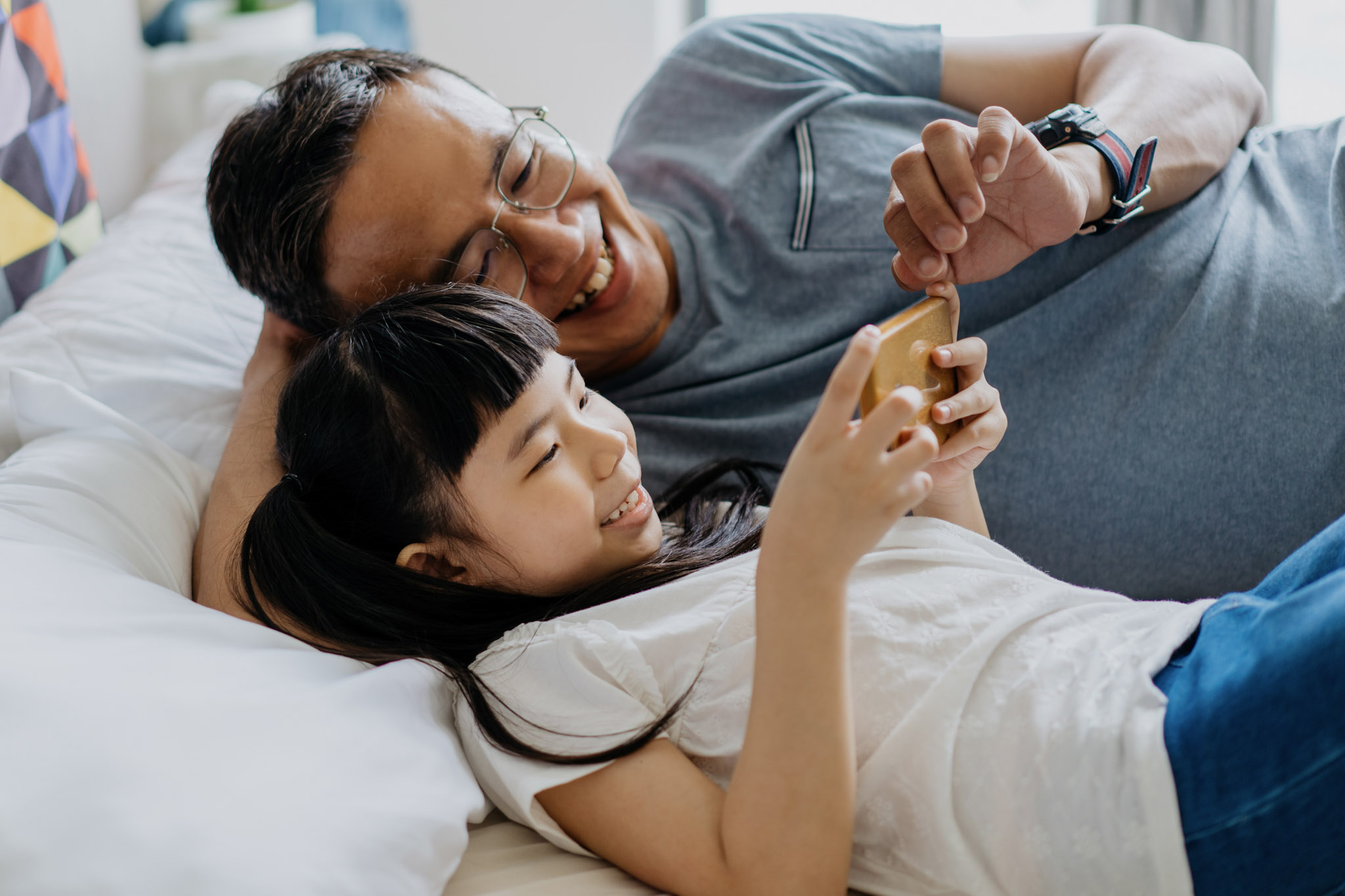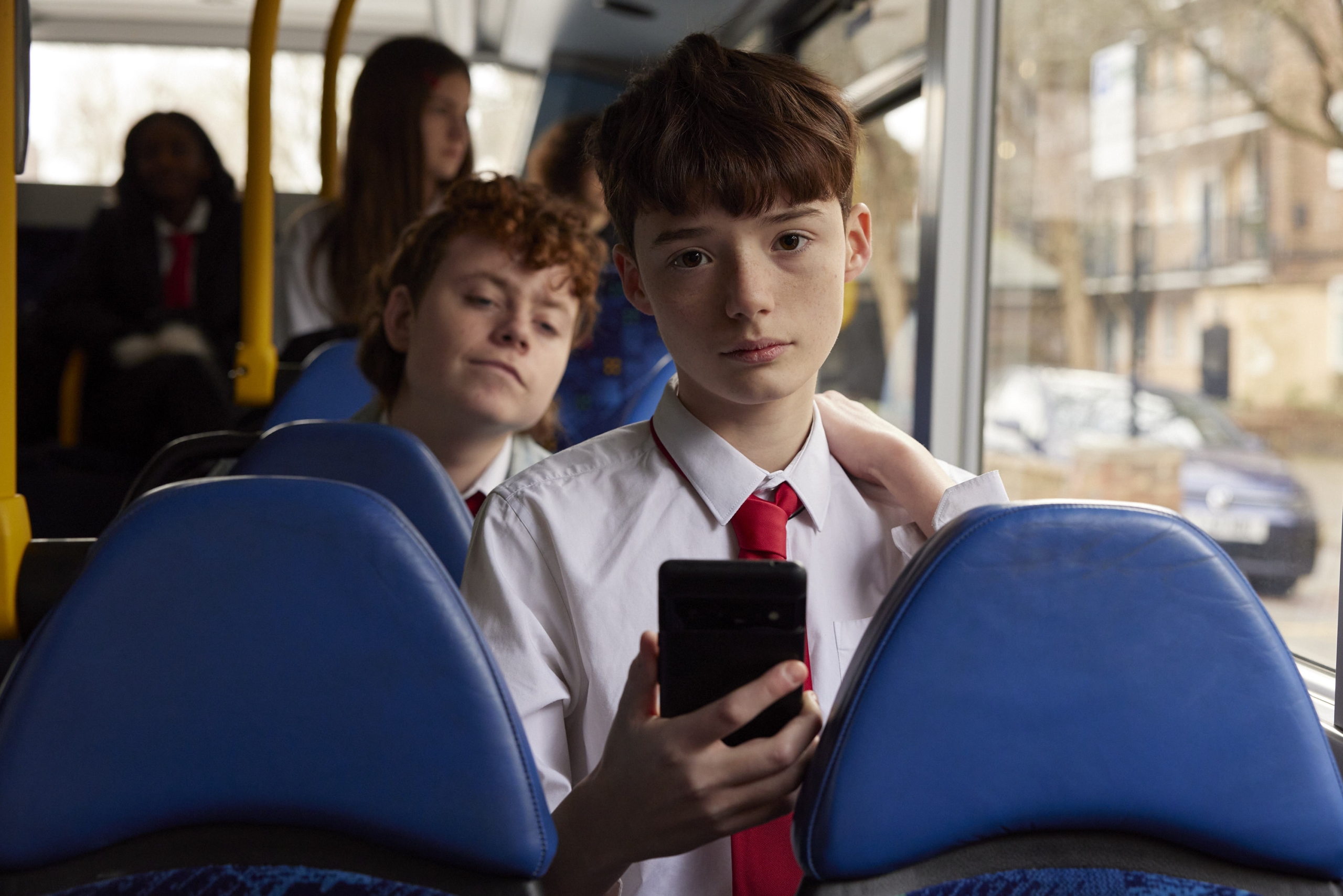
These expert-led questions can help you determine whether your child is mature enough to get their first smartphone.
There are many conflicting ideas on when is the best time to get your child their first smartphone. From when they start travelling to primary school on their own, to when they start secondary school. Or perhaps it’s merely when you can no longer bear the constant begging nag of a question: “Muuuuuum, can I have a phone?”
Almost two-thirds of UK children (61% to be exact) own a smartphone by the age of 10. Just because there seems to be a consensus, though, does not mean there’s no controversy. It’s only natural to worry about when, exactly, is the right moment to put a smartphone into the hands of your own children.
Having a phone means that they can keep in touch with you and stay safe. It could help them research their hobbies, discover new passions, finish their homework, communicate with friends and family. But it might also expose them to the darker sides of online life or distract them from their real-world passions.
Over a third of parents say choosing when to get their child a phone is one of the hardest decisions they make
To help determine if you and your child are ready to take the leap, here are some expert-suggested questions you might ask yourself, and them, to help you weigh up the pros and cons.
Questions to ask yourself
1. Can your child self-regulate?
Dr Gemma Stevens, psychology lecturer at Glasgow Caledonian University and mother of two: Children go through a series of developmental stages as they grow. Depending on their current stage, they might be unable to regulate their smartphone use for themselves and hence need their parents’ help, much in the same way that they need parents to regulate how many sweets they eat.
Excessive use of smartphones is associated with cognitive impairments, sleep disorders, psychiatric disorders and troubles regulating emotions. If your child [when borrowing someone else’s device] is unable to reflect on their screen time, take instruction to put phones away at dinner or at bedtime, then you might want to delay giving them a smartphone for another six months or so, and then review again.
How to talk to your teenage sons about online toxicity
2. Can they enter into a social contract and stick to it?
Dr Stevens: We all know what happens to that puppy that children beg for… agreements are made that the children will take responsibility for walking and feeding it. But after a while, inevitably, it’s left to the parents to deal with.
It’s important that the agreements, parameters and ground rules on smartphone use don’t fall by the wayside in the same way. So it’s a good idea to consider whether you think your child is ready and able to follow through with the terms that you have agreed, not just for the first few weeks, but in the long-term.
I suggest that before any smartphone is purchased, you create a social contract with your child about what that device will be used for, and the parameters and ground rules that will be in place. What’s in that social contract will be up to you, but it might include a screen time limit per day; times of the day and night when use isn’t permitted (school and dinner time for example); no phone at least an hour before bed to ensure no sleep disruption; permission needing to be granted before any app is downloaded, and some that are just not allowed. Make sure your child understands that breaching the contract will result in removal of the device until such time they are able to stick to it.
Digital Family Pledge
We have to acknowledge that smartphones have lots of benefits for young people, such as being able to update parents on their whereabouts and social connectedness with peers. But the psychological risks must be considered and managed to ensure that we support our young people whilst their brains are still developing.
If your child may not be ready to stick to the contract, I would encourage you to refrain from a blanket “no” to a request for a smartphone. That is a great opportunity to have an open dialogue about the risks associated with smartphone use. An outright “no” can make something more desirable. So rather than “no”, try “not yet.”
3. What is the purpose of giving my child a phone and what will they be using it for?
Natalie Costa, child and parent coach and founder of teaching, coaching and mindfulness service Power Thoughts: Establishing the bigger ‘why’ behind giving your child a phone often makes the decision a clearer one. Is it going to be used for staying in touch with your child, giving them access to learning or communication? Or will it be used only as a means of entertainment for your child?
I’d suggest bringing your child into this conversation, hearing their thoughts about why they want it and what they’re going to be using it for. Perhaps it may be that they want to communicate with their friends, use an app their friends are using, stay connected with you as they are developing their independence, or access their learning and work. Reasons like these don’t mean you will automatically agree to giving them a phone, but by bringing them into the conversation you’re letting them know that their opinion matters and that you’re taking their request seriously.
The idea here is that you’re working collaboratively – it’s you and me vs the phone, instead of me vs you and the phone.
Teaching your kids to question what they see online, on TV and in the papers
4. Are social factors or peer pressure influencing my decision to get my child a smartphone?
Dr Peter Macaulay, Senior Lecturer in Psychology at the University of Derby: It may seem ‘easier’ to go with what everyone else is doing at that time, but it is important to consider the influence of social and peer influences when deciding whether to give your child a smartphone.
In the development stage that is early adolescence, children strive to fit in, to be accepted by the peer group and ultimately not rejected by them. To gain and maintain a good status with peers becomes a heightened priority, so you might find yours asking for a smartphone because they want what other children in their peer group have, and because it is seen as a status symbol.
This is a common and normal experience for children. But it is important for parents to reflect on it, and consider whether their child really needs a smartphone, or whether their desire is primarily influenced by peer pressure? Have a conversation with your child about the reasons why you might get them a mobile phone, to ensure the decision conforms to your family values and is based on their individual needs, rather than external pressures.
Sharenting: How sharing too much online could put your kids in danger
Questions to ask your child
5. What’s your favourite thing to do online?
Dr Macaulay: Research suggests that children think they know how to stay safe online and the types of dangers they may come into contact with, but struggle to articulate what they would do if they encountered these online risks.
So it is important for parents to start a conversation before giving their child a smartphone, and continue this conversation when children have one.
Initially, listen to your child and ask open questions about what they do online – this will show them you are interested in what they are doing, and also give you a picture of how they might use a smartphone. You could ask what their favourite thing to do is, or get them to show you a new game they have been playing.
It is important children feel they can have an open conversation about these topics in a non-judgemental environment so that if something negative does arise, they know they can talk to you.
6. How will you make sure that you use your phone responsibly?
Natalie Costa: Giving your child a sense of autonomy in the decision-making process about getting a phone, and then setting the boundaries around its use, is likely to make them more motivated to follow through with your agreement.
What to do if your Vodafone phone gets lost or stolen
Some questions to consider asking them are: How much time do you think is acceptable or reasonable to be spending on your phone? How are you going to balance your screen time? What other activities will you do when you’re not on your phone?
7. What’s your plan if you’re asked to share pictures or information you’re not comfortable with?
Natalie Costa: No parent wants to have these conversations, but it’s imperative that you do. Start by asking them what they think about the range of images that can be sent online, and how this makes them feel? Explore what their plan is if they are asked to share information online. Ask how they will know what’s appropriate to send, and what’s not.
These may sound like uncomfortable conversations, but having a phone comes with the responsibility to think through these challenges, and know what you can do to support yourself. Rather than one big conversation, this will probably involve numerous smaller conversations about individual subjects ranging from sexting to porn and basic online safety. It’s crucial that your child is aware of these challenges – and more importantly, knows the steps to take to navigate them.
Stay up to date with the latest news from Vodafone by following us on Twitter and signing up for News Centre website notifications.








